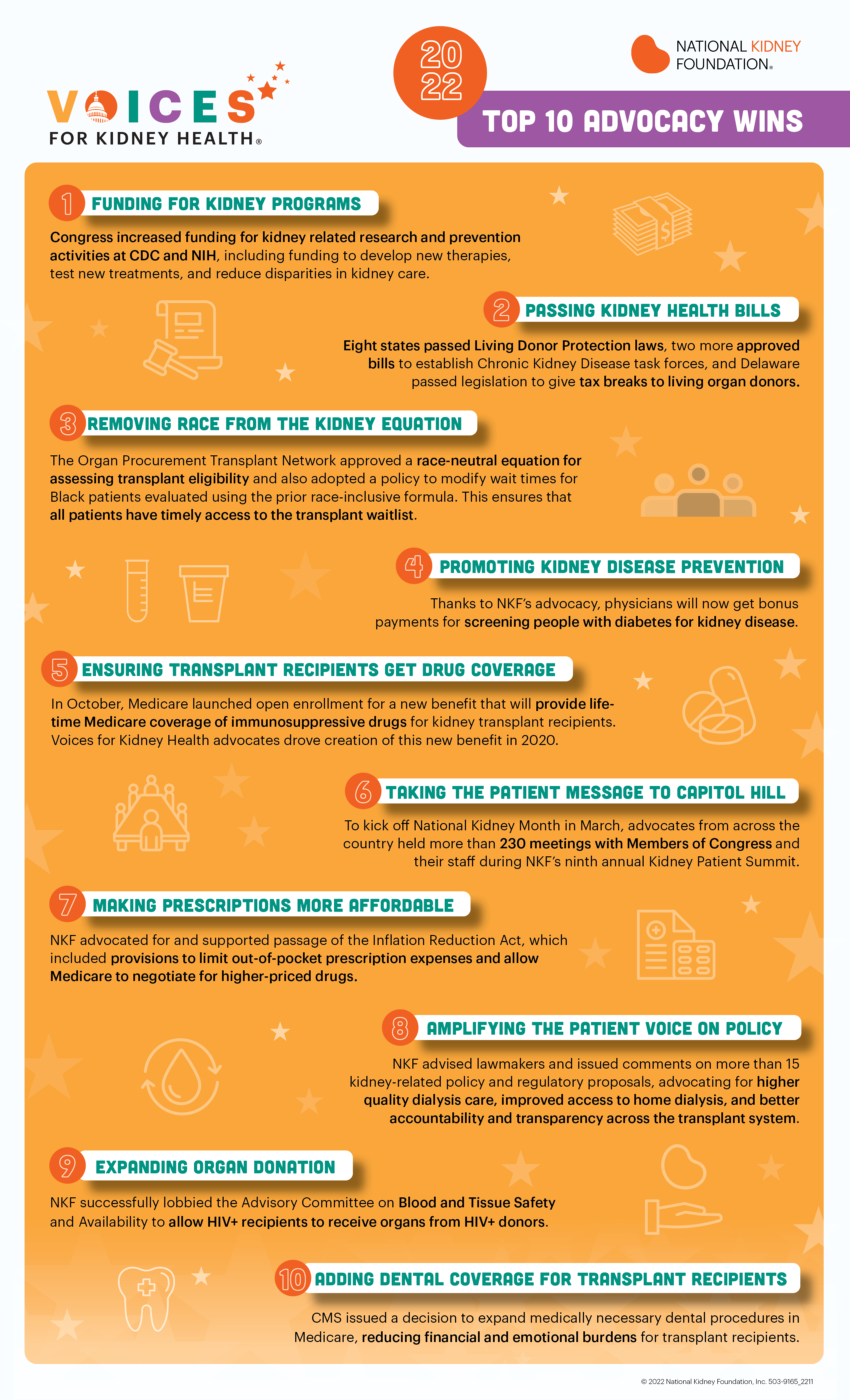December 13, 2022
In 2022 the National Kidney Foundation and Voices for Kidney Health advocates from across the country worked together to advance a policy agenda that ensures better care for the kidney patient community at the local, state, and federal levels. While there were many successes to be proud of, here are our top 10 most influential policy changes of 2022.
1. More funding for kidney programs
The House increased funding for kidney-related research and prevention programs at the Centers for Disease Control and Prevention (CDC) and National Institutes of Health (NIH).
Their appropriations bill would:
- Develop new therapies to prevent kidney disease.
- Test new treatments
- Reduce racial, ethnic, and socioeconomic disparities in kidney care.
Learn more about these critical investments.
2. States continue passing kidney health bills
Eight states passed Living Donor Protection laws, two more approved bills to establish Chronic Kidney Disease task forces, and Delaware passed legislation to give tax breaks to living organ donors. Keep reading about state policy wins.
We need every voice for kidney health to ensure patients are heard across the country. Sign up to become an NKF advocate to help improve kidney health policy in your own state.
3. Removing race from the kidney equation
The Organ Procurement Transplant Network (OPTN) board unanimously approved the adoption of a race-neutral eGFR calculation for all transplant centers, along with modifying wait times for Black patients evaluated using the race-inclusive formula. Now, all people with kidney disease–regardless of race–will have timely access to the transplant waitlist.
Learn more about NKF’s tireless work to remove race from kidney disease diagnosis.
4. Promoting kidney disease prevention
Thanks to NKF’s advocacy, physicians will now get bonus payments when screening people with diabetes for kidney disease. While annual kidney health evaluation in patients with diabetes to determine the risk of Chronic Kidney Disease had previously been recommended, the performance of these tests in patients with diabetes was low.
Learn about the new guidelines for diabetes and kidney disease.
5. Ensuring transplant recipients get the drug coverage they need
In October 2022, Medicare launched open enrollment for a new benefit to provide lifetime Medicare coverage of immunosuppressive drugs for kidney transplant recipients. The coverage allows more people to access immunosuppressant medication and keep their kidney transplants.
Learn more about the expanded Medicare coverage.

6. Bringing the kidney patient perspective to Capitol Hill
To kick off National Kidney Month in March, advocates from across the country held more than 230 meetings with Members of Congress and their staff during NKF’s ninth annual Kidney Patient Summit.
This yearly event represents a unique opportunity for the kidney disease community to:
Share their stories with key decision-makers.
Educate congress members about kidney disease.
Communicate how congress can best serve the people they were elected to represent.
Learn more about our advocates’ impact during Kidney Patient Summits.
7. Passing legislation to make prescriptions more affordable
NKF advocated for and supported the passage of the Inflation Reduction Act (IRA), which included provisions to limit out-of-pocket prescription expenses under Medicare Part D. It also allows Medicare to negotiate for higher-priced drugs.
See how the new IRA legislation may help you.
8. Amplifying the patient voice on regulatory policy
NKF advised lawmakers and commented on more than 15 kidney-related policy and regulatory proposals.
Advocates endorsed:
Higher-quality dialysis care.
Better access to home dialysis.
Accountability and transparency across the transplant system.
Get the most up-to-date commentary on kidney disease policy.
9. Expanding organ donation to high-risk recipients
As passionate proponents for health equity, NKF successfully lobbied the Health and Human Services (HHS) Advisory Committee on Blood and Tissue Safety and Availability to allow people who are HIV+ to receive organs from donors who are HIV+.
Learn more about this historic win for people who are HIV+.
10. Dental coverage for transplant recipients
The Centers for Medicare and Medicaid Services (CMS) decided to expand medically necessary dental procedures in Medicare. The new coverage reduces financial and emotional burdens for transplant recipients as they will no longer need to worry about the risk of oral infection or dental complications before or during transplantation.
See if you qualify for more dental coverage.
Join our Voices for Kidney Health Advocates Community
Thank you to all the advocates, families, and professionals who have dedicated their time to advance change across state and federal governments. We look forward to seeing what you’ll accomplish in the new year.
Want to become a part of our fantastic advocate community? See all the ways you can take action and make a difference.









